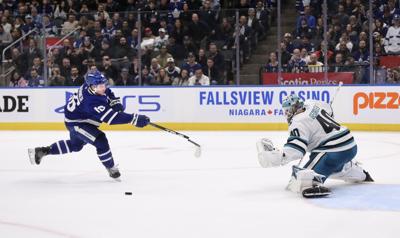Ever since the Maple Leafs averaged fewer than two goals a game in a seven-game playoff loss to Boston last spring and saw their power play shrivel away to nearly nothing, general manager Brad Treliving has to have known his team needed to add offence. Somewhere.
But he hasn’t done it. He hasn’t brought in a legitimate offensive contributor for the blue line. He hasn’t added a bottom-six scoring threat, a power-play quarterback or anyone who can play in the top six and skate alongside his top four forwards.
Now, it’s coming back to bite him.
It was all fine earlier this season when the Leafs were getting outstanding goaltending and very good defensive outcomes. But now that Treliving’s squad has plummeted to 17th in defence, teams are pressuring more aggressively and scoring has become a major problem.
When you’ve held your opponent to two goals or fewer just twice in the past 11 games, the need for scoring is amplified.
The Leafs scored a combined four goals in losses to Florida and Ottawa this week, managing 48 shots in total. Watching the Leafs struggle to get to double digits in shots has become a regular occurrence, as it was again on Saturday night against the Senators. Toronto, no longer one of the NHL’s top possession teams, ranks 18th in shots on goal.
Leafs management decided to try to make the team sturdier defensively after losing to Boston in the playoffs, and spent a good deal to do that. As far as offence, Max Pacioretty was given a tryout in the hope that he might find his former scoring prowess, but that was it.
The thinking seemed to be that they had enough offence with Auston Matthews, William Nylander, Mitch Marner and John Tavares, particularly since only Tavares had been healthy in the ‘24 post-season. It was also hoped that maturing young wingers Matthew Knies, Bobby McMann and Nick Robertson would help them remain a lethal offensive team.
As the season has moved along, however, Matthews has struggled to stay healthy and is nowhere near his 69-goal pace of a year ago. Marner and Nylander have been very productive. Knies, McMann and Robertson have had their moments and all have upside, but they haven’t made up the difference compared to last season, when the Leafs were No. 2 in offence in the regular season. Pacioretty, meanwhile, just couldn’t stay healthy.
At the March 8 trade deadline, Treliving had one last opportunity to add offensive punch and again made other choices, like improving his penalty killing. Scott Laughton is primarily a checker. Brandon Carlo is another stay-at-home defender unlikely to help Toronto’s blue line corps — worst in the NHL in terms of creating offence — score more goals.
Morgan Rielly remains Toronto’s best offensive defenceman, but he is having a bizarre season: 33 points, but minus-20 on a team where the next worst in plus-minus is Philippe Myers at minus-seven. Rielly’s offensive numbers are well off his best, and he no longer skates on the No. 1 power-play unit.
On Saturday night, coach Craig Berube resorted to scrambling his forward lines to create more offence, but to little effect. Marner, in particular, seemed to struggle, as was the case against Florida. Given the soap opera that unfolded around him at the deadline, you have to wonder if the season-long discussion about his future has worn him down. Or maybe the intensity of the 4 Nations was extra work he just didn’t need.
The Leafs had three options with Marner this season: sign him, convince him to waive his no-trade clause or let him play out his contract. He is now playing out his contract and headed to free agency, which means Treliving was unable to generate a more concrete resolution with the Leafs’ most effective attacker this season.
There’s a theme here. Treliving had no problem giving 35-year-old defenceman Chris Tanev a six-year, $27-million (U.S.) deal — and Tanev has been a very good addition — but there has been no similar investment in offensive forwards.
In the five-game, second-round elimination at the hands of Florida in 2023, the Leafs scored more than two goals just once. Against Boston last spring, they scored 12 in seven games. It could be that Treliving doesn’t recognize this as a vulnerable area, or he has been powerless to do anything about it.
Either way, the Leafs used to be a team that scored buckets in the regular season but struggled to do the same in the playoffs.
Now, having done nothing to improve on the attack, they’re struggling to score in the regular season and hoping against hope they’ll magically find the net more in the playoffs.































To join the conversation set a first and last name in your user profile.
Sign in or register for free to join the Conversation